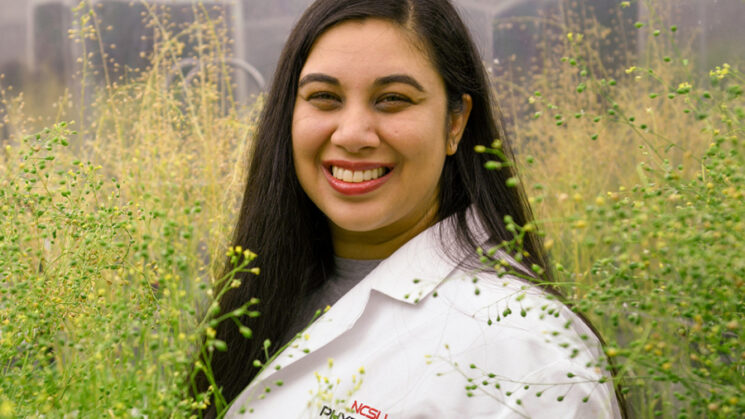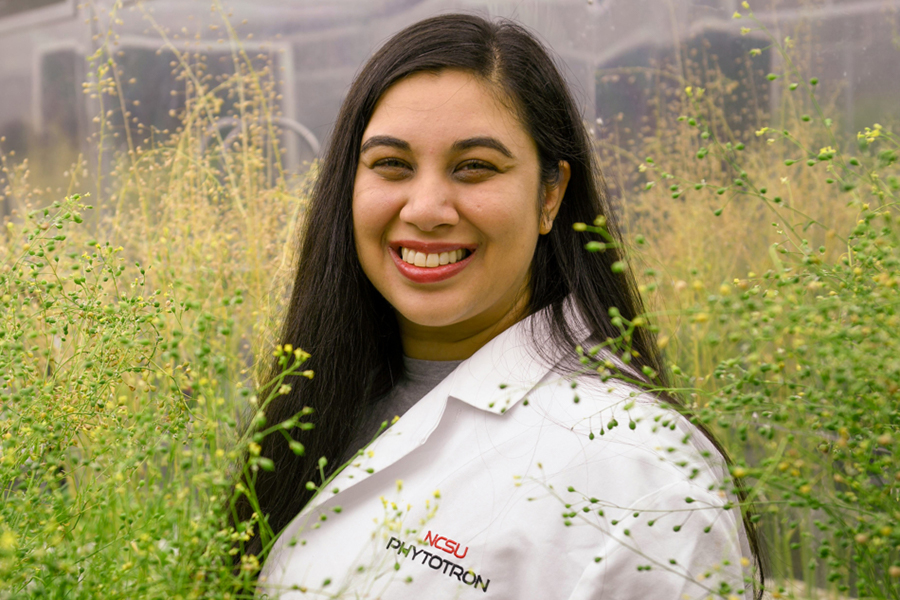

Jabeen Ahmad is a member of the 2020 AgBioFEWS Fellowship cohort
Excerpt from:
Sunrise to Startups, Grad Students Plan Futures >
CALS graduate students keep an eye on farming’s horizon. In labs and fields, they’re working to solve today’s problems and preparing to take on tomorrow’s challenges.
AN INTERDISCIPLINARY JOURNEY
Jabeen Ahmad headed to law school with a strong desire to help people, and in her time as a trial lawyer and public defender, she did just that. But the hard, often heartbreaking work wasn’t something she could sustain. She started looking for different ways to use her legal background, along with the communication skills she learned studying journalism and anthropology as an undergraduate.
To strengthen her scientific foundation, Ahmad came to NC State, where she completed a master’s degree in physiology and is now a third-year doctoral student in plant biology.
“Interdisciplinary studies are crucial now. It is absolutely essential to have a skill set that can cross into all of these different spheres,” she says.
Ahmad says her new experiences provide a pathway for doing what she really loves, “constantly being challenged, solving problems, learning new things, and then being able to use the legal skills I have in order to help people innovate and protect their inventions.” Her goal is to help people turn their ideas into reality.
To feed a growing population, innovation will be vital to shaping farming for the future, she says. The key question she’s working on: “How can we develop technology that can change our farming processes, or even change the crops and the plants that we use, to meet this demand of providing enough food to feed everyone?”
Specifically, Ahmad and her advisor, Amy Grunden, William Neal Reynolds Distinguished Professor of Microbiology, have been studying the microbiome—bacteria, fungi and other organisms—that live in soil or on plant roots. They’re looking for ways that these microbes can help plants adapt to challenges without pesticides, fertilizers and other potentially harmful chemicals.
“If we can find more ways to naturally help plants survive and thrive in adverse conditions, then that really opens up an entire world of research and possibilities for crop production, for food sustainability and for environmental rehabilitation,” Ahmad explains.
Some farming innovations, like genetically modified crops, are hard to understand, and thus not always well received. Ahmad says that’s where an interdisciplinary background like hers can be helpful.
“It is really important for us in the research world, in the science world, to be able to communicate what it is that we’re doing, why it’s important and clear up all of the misunderstandings that exist out there,” she says.
After her doctoral studies, Ahmad hopes to be part of an agricultural technology startup. She wants to do research, offer guidance and bring together interested parties. Just as she once did in court, she wants to help reach solutions that allow people to thrive.
This story originally appeared in NC State CALS Magazine at https://magazine.cals.ncsu.edu/from-sunrise-to-startups-grad-students-plan-futures/